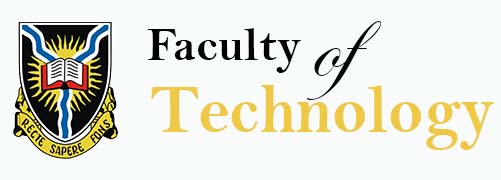ACADEMIC PROGRAMMES
- ACADEMIC PROGRAMMES
The following are the titles of the programmes (both Undergraduate and Postgraduate) being offered in the Department:
(i) B.Sc. Civil Engineering
(ii) M.Sc. (Structures and Materials Engineering; Water Resources and Environmental Engineering; Highway and Transportation Engineering; Foundation and Geotechnical Engineering)
(iii) M.Sc Construction Project Management
(iv) Ph.D. (Structures and Materials Engineering; Water Resources and Environmental Engineering; Highway and Transportation Engineering; Foundation and Geotechnical Engineering)
- PROGRAMME EDUCATION OBJECTIVES (PEOS)
PEO | Attribute | Description |
PEO1:
| Preparation | Graduates who are ableto practice in Civil Engineering areas such as Structures, Highway, Geotechnics, Water and Environmental as well as Public Health Engineering. |
PEO2:
| Core Competence | Graduates who are masters in their chosen areas of specialization in the public, private and other sectors of the economy. |
PEO3: | Invention, Innovation and Creativity | Graduates who have the capability to contribute towards the expansion of the frontiers of engineering knowledge through invention, innovation and creativity. |
PEO4: | Career Development | Graduates who can translate the acquired knowledge through the habit of lifelong learning for career development to actual practice for global relevance. |
PEO5: | Professionalism | Graduates that can work in multi-disciplinary environment with high level intellectual and interpersonal relationship skills while conforming to the ethics of their profession.
|
- MAPPING OF POs TO PEOs
POs | PEOs |
PO1: Engineering knowledge: Apply the knowledge of mathematics, science, engineering fundamentals, and an engineering specialization to the solution of complex engineering problems.
| PEO1: Graduates who are ableto practice in Civil Engineering areas such as Structures, Highway, Geotechnics, Water & Environmental as well as Public Health Engineering.
|
PO2: Problem analysis: Identify, formulate, review research literature, and analyze complex engineering problems reaching substantiated conclusions using first principles of mathematics, natural sciences, and engineering sciences.
| PEO3: Graduates who have the capability to contribute towards the expansion of the frontiers of engineering knowledge through invention, innovation and creativity.
|
PO3: Design/development of solutions: Design solutions for complex engineering problems and design system components or processes that meet the specified needs with appropriate consideration for the public health and safety, and the cultural, societal, and environmental considerations.
| PEO3: Graduates who have the capability to contribute towards the expansion of the frontiers of engineering knowledge through invention, innovation and creativity.
|
PO4: Conduct investigations of complex problems: Use research-based knowledge and research methods including design of experiments, analysis and interpretation of data, and synthesis of the information to provide valid conclusions.
| PEO4: Graduates who can translate the acquired knowledge through the habit of lifelong learning for career development to actual practice for global relevance.
|
PO5: Modern tool usage: Create, select, and apply appropriate techniques, resources, and modern engineering and IT tools including prediction and modeling to complex engineering activities with an understanding of the limitations.
| PEO3: Graduates who have the capability to contribute towards the expansion of the frontiers of engineering knowledge through invention, innovation and creativity.
|
PO6: The engineer and society: Apply reasoning informed by the contextual knowledge to assess societal, health, safety, legal and cultural issues and the consequent responsibilities relevant to the professional engineering practice.
| PEO5: Graduates that can work in multi-disciplinary environment with high level intellectual and interpersonal relationship skills while conforming to the ethics of their profession.
|
PO7: Environment and sustainability: Understand the impact of the professional engineering solutions in societal and environmental contexts, and demonstrate the knowledge of, and need for sustainable development.
| PEO2: Graduates who are masters in their chosen areas of specialization in the public, private and others sectorsof the economy.
|
PO8: Ethics: Apply ethical principles and commit to professional ethics and responsibilities and norms of the engineering practice.
| PEO5: Graduates that can work in multi-disciplinary environment with high level intellectual and interpersonal relationship skills while conforming to the ethics of their profession.
|
PO9: Individual and teamwork: Function effectively as an individual, and as a member or leader in diverse teams, and in multidisciplinary settings.
| PEO5: Graduates that can work in multi-disciplinary environment with high level intellectual and interpersonal relationship skills while conforming to the ethics of their profession.
|
PO10: Communication: Communicate effectively on complex engineering activities with the engineering community and with society at large, such as, being able to comprehend and write effective reports and design documentation, make effective presentations, and give and receive clear instructions.
| PEO5: Graduates that can work in multi-disciplinary environment with high level intellectual and interpersonal relationship skills while conforming to the ethics of their profession.
PEO2: Graduates who are masters in their chosen areas of specialization in the public, private and others sectorsof the economy.
|
PO11: Project management and finance: Demonstrate knowledge and understanding of the engineering and management principles and apply these to one’s own work, as a member and leader in a team, to manage projects and in multidisciplinary environments.
| PEO5: Graduates that can work in multi-disciplinary environment with high level intellectual and interpersonal relationship skills while conforming to the ethics of their profession.
PEO2: Graduates who are masters in their chosen areas of specialization in the public, private and others sectorsof the economy.
|
PO12: Life-long learning: Recognize the need for and have the preparation and ability to engage in independent and life-long learning in the broadest context of technological change.
| PEO4: Graduates who can translate the acquired knowledge through the habit of lifelong learning for career development to actual practice for global relevance.
|
- 606 views
